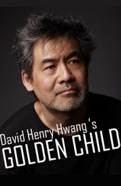Revisiting a Beloved Child: Playwright David Henry Hwang on the Off-Broadway Journey of Golden Child
About the author:
Playwright David Henry Hwang first made Broadway waves in 1988 with his Tony-winning tour-de-force M. Butterfly, based on Puccini’s classic opera. Eight years later, Golden Child, a play based on Hwang’s own Chinese family, premiered at the Public Theater and later opened on Broadway starring Julyana Soelistyo and Randall Duk Kim. Now, the prolific playwright is bringing his vibrant family drama back to the New York stage at off-Broadway's Signature Theatre Company, starring Soelistyo (in a different role), Jennifer Lim, Greg Watanabe and more. Below, Hwang recounts the family history that inspired Golden Child and his ever-evolving relationship with his plays.
![]()
Plays are never finished, only abandoned. I don’t know who originally said that, but I agree. I’m one of those dramatists who loves to rewrite, who believes we are called play-wrights because we painstakingly craft our works into existence. The first time I hear a new script, I’m thinking about how to fix its problems. I continue to refine and rework through workshops, rehearsals and preview performances. At some point, however, the game gets called; Opening Night approaches. The critics are coming, so the show gets “frozen,” and I can make no further changes. Writing a play is like raising a child. You do your best, then one day, you run out of time. Your child leaves, and goes out into the world.
Golden Child, currently being revived at the Signature Theatre to kick off my tenure as its Residency One playwright, was first produced at the Public Theater in 1996, directed by the great James Lapine. Subsequently, this show was guided by the late producer Ben Mordecai through developmental productions around the country and internationally, before arriving on Broadway in 1998. Yet when I thought about which plays to include in my Signature season, Golden Child came immediately to mind. Despite more than two years developing the piece, I’d always felt it was not completely finished—that I had abandoned it too soon.
Golden Child is based on the stories my grandmother told me as a child about our family history. When I was 10 years old, she fell ill, and we believed she was going to die. My “Ama” was the family historian. I felt that if she passed away, we would suffer a double loss: not only my grandmother, but all her stories from our past. A Chinese American kid living in Los Angeles, I asked my parents if I could spend the summer visiting her in the Philippines. I took what we would now call oral histories, recording her stories onto cassette tapes, before returning home to California and compiling them into a 90-page nonfiction “novel” about the history of my family. Several decades later, I used these youthful writings as source material for a play about my great-grandfather, who converted to Christianity in China around 1918, and then, because Chinese men were polygamous, had to figure out what to do with his three wives.
My problem with my play lay in its “bookends.” The story starts in the present, goes back to 1918 where the bulk of the action takes place, the returns to the present to end. At the Public, the present-day action featured an autobiographical character in his 30s, visited in the back seat of a cab by the ghost of his grandmother. By the time we got to Broadway, the contemporary character had become a 50-ish man conflicted about the birth of his first child. Neither solution completely satisfied me; they felt bulky and rather contrived. I’d also considered cutting the bookends completely, before concluding that they were necessary to provide some perspective on a morally complicated story.
Preparing for the current revival, I had some very helpful conversations about the script with my director, Leigh Silverman, as well as with Signature’s Artistic Director Jim Houghton and my longtime dramaturg Oskar Eustis. Finally, it hit me: Why not just tell the actual story of how I learned these family stories? I began writing, and the new bookends came to life easily. They were simpler: a grandson visiting his grandmother in search of her tales. Yet they were also more complicated; it’s unusual for a child to treasure his family history. Why does this boy feel the need? How does he end up regarding his great-grandfather after hearing his grandmother’s story?
As soon as I heard Greg Watanabe and Annie Q, two of the wonderful actors in our Signature revival, read the new bookends as child and grandmother, I knew that this idea was right. After trimming and polishing the scenes, I hardly touched them at all once we got into previews. For me, they resonated with depth, as well as a lightness of touch, which complimented the heavier dramatic action in the body of my play. And so, on opening night at Signature, I felt happy, after all these years, to abandon my play once again.
